The Life of a Guide Dog
Audrey from Guide Dogs for the Blind Association details the ins and outs of training, matching dogs to the right owners and the importance of volunteers.
Training
Golden retrievers, Labradors and German Shepherds are the most common breeds used as guide dogs in Britain as well as combinations of each. In an effort to expand the UK gene pool, GDBA even swaps dogs with other countries to increase the chances of producing the best qualities; they recently added Poodles from Norway to the mix which proved successful. The charity have their own breeding centre in Leamington Spa where puppies are bred for adaptability and drive to work and play. Puppy walking begins at 6 weeks and ends at 14 months and in this time they will learn the basic do’s and don’ts behaviour wise along with commands that won’t differ massively from the average puppy intended as a pet. That includes toilet training (waterproof dog beds help with that!) and simple instructions such as recall, sit and stay.
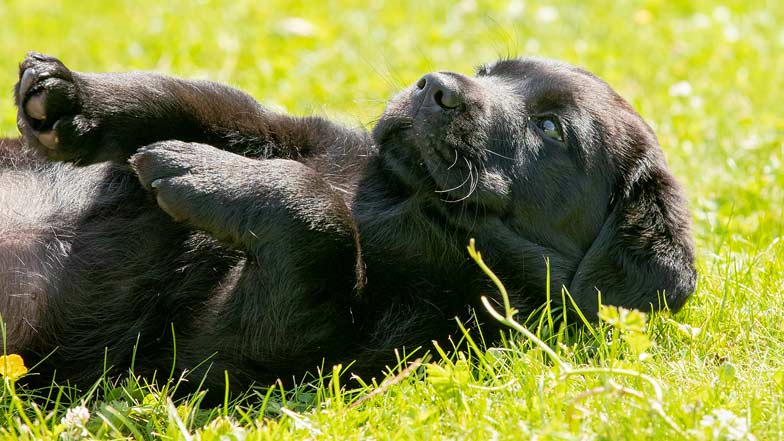
Marley the black lab puppy laying in the grass
The training gets more specialised at 14 to 20 months when the dogs will learn some low level guiding tasks. Where the average dog might be taught not to pull on the lead, guide dogs need to maintain some tension to lead their owner in a particular direction. One of the most important aspects of training is to teach the dogs not to become distracted by their environment; anyone that’s had a puppy will have experienced excessive pulling, barking or resisting when walking in new environments where the dog encounters loud noises, new people or other dogs. It is crucial that young guide dogs are exposed to new environments and learn to keep their cool no matter what. At 20 months comes 10 weeks of advanced training where the dog will be matched to a visually impaired client and will learn their routine along with regular walking routes in the area.
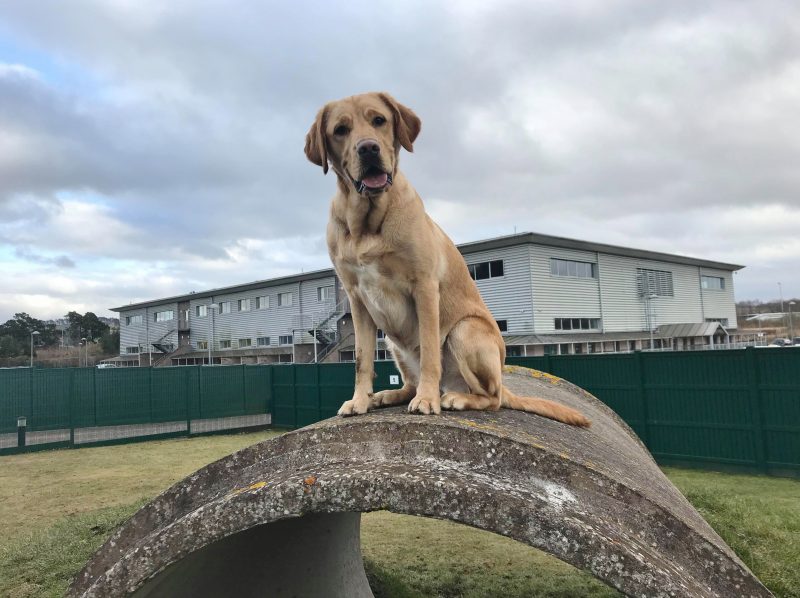
Triumphant golden retriever in front of the GD training school
Matching
Matching dog to owner is more complicated than you might think. First and foremost, the temperament of the dog needs to match the lifestyle of it’s owner; an energetic dog will be no use with someone that doesn’t leave the house regularly or for decent lengths of time and a laid back dog won’t be motivated enough to lead a fast walker. Location plays a role too; dogs that are required in central London need to have a high work drive to cope with the hustle and bustle whereas dogs in the small villages need to be content with a simpler life. Audrey explained how a 6 foot 6 man who walked very fast had to wait two and half years for a dog because they couldn’t match him with one with enough speed and that was tall enough to give him a comfortable arm position when walking.
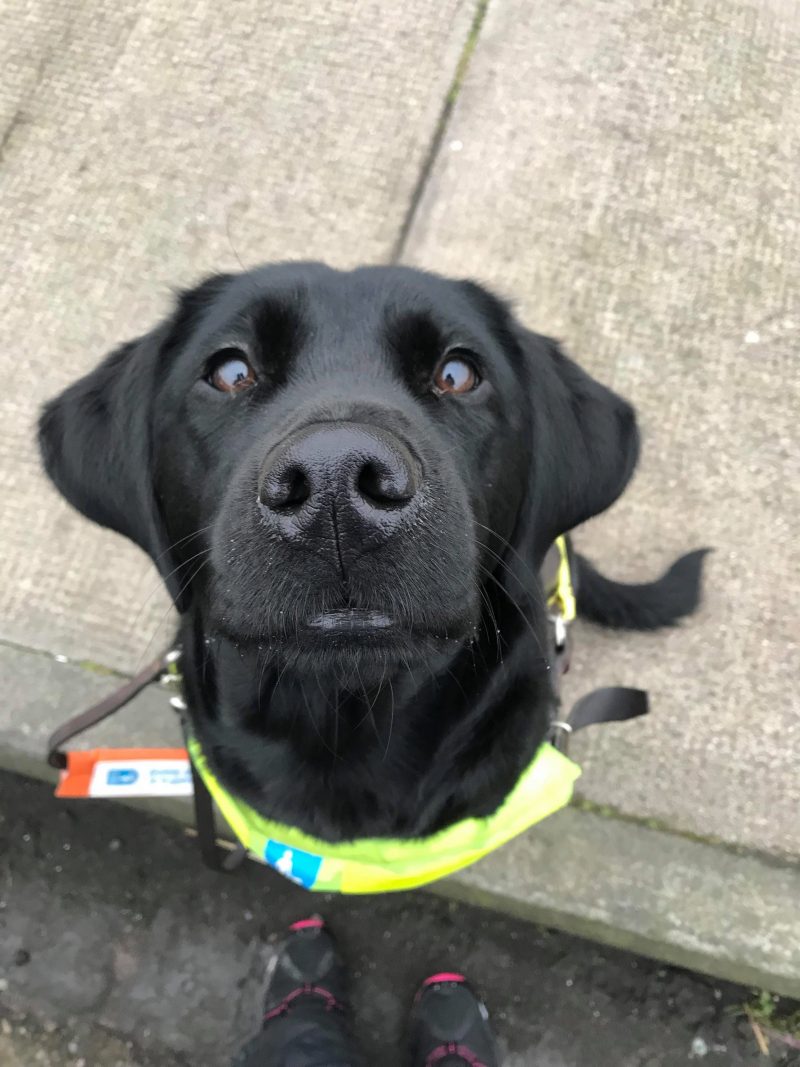
Black labrador Minnie sitting for the camera during training
Retirement
Dogs will usually retire at around aged 10 but that will vary depending on their health or workload. Owners with a less active lifestyle will be able to keep dogs further into their old age. After retiring the dogs will either stay with the owner as a pet, go to a friend or family member or be rehomed with a member of the public. GDBA has a rehoming scheme where you can apply for both retired dogs and dogs that fail the training programme. You won’t find a more chilled out and socialised dog than an ex guide dog! You can learn more about rehoming a guide dog here. Remember that all dogs in their old age are prone to arthritis and other joint problems, you can help keep those joints in good health by exercising them on grass rather than concrete and using a thick hollow-fibre mattress dog bed at home to keep them off the cold floor.
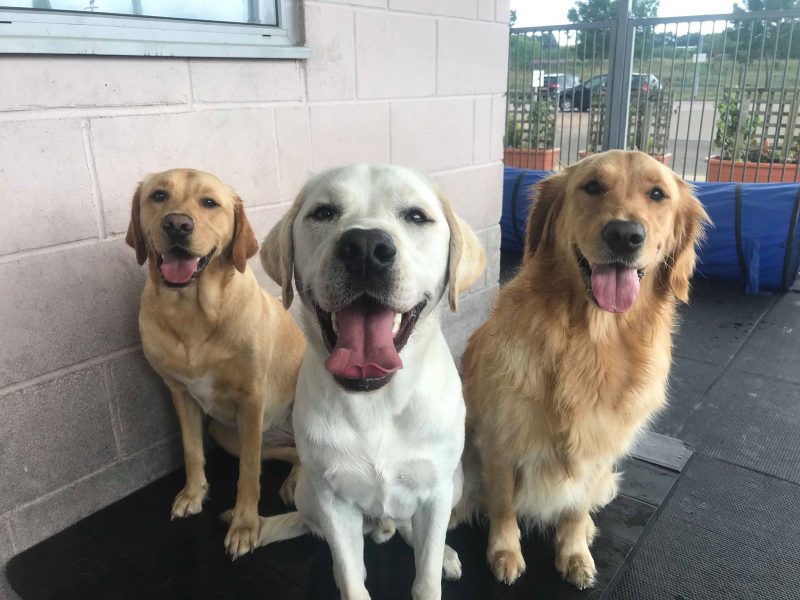
3 happy guide dogs sitting patiently
Alternative Careers
75% of dogs are successfully trained and go on to work with blind clients but what about the rest? Puppies that can’t be used as guide dogs may go to other charities including canine partners, dogs for the disabled or hearing dogs. They are also used as buddy dogs for children with sight loss. Dogs that are ball obsessed will go to the police who use this high energy reward as part of their training. Some were even used as Covid detection dogs like Ivan, a Labrador cross Golden Retriever who was too distracted around other dogs to work on a harness. He found his true calling off the lead and working independently sniffing out the virus.
Boarder Homes
Audrey has been working for Guide Dogs for the Blind Association for 14 years and is now the head of Recruitment of Volunteer Boarders. She worked her way up from admin and is delighted with her job. Jobs at the charity rarely come up because hardly anyone leaves – who wouldn’t want to spend their 9-5 around well-trained Golden Retrievers! The kennel staff generally aim to become trainers and even getting into the kennel team is tough; Audrey said they had recently advertised for two kennel jobs and received 110 applicants! 84 boarder homes are needed to look after dogs that are currently on their training programme or who’s owner is ill or away. The boarders are expected to look after the dogs overnight and transport them to and from their training school each day (check out our travel dog bed which folds to fit in your car). Generally it’s a good deal for them, they get all the benefit of dog ownership without any of the financial costs or hassle when leaving for a week or two on holiday – temporary homes or kennels are arranged by Audrey and her team. Having said that, it can be upsetting for a volunteer boarder to give a dog away again that they’ve formed a bond with and watched go from strength to strength on the training programme.
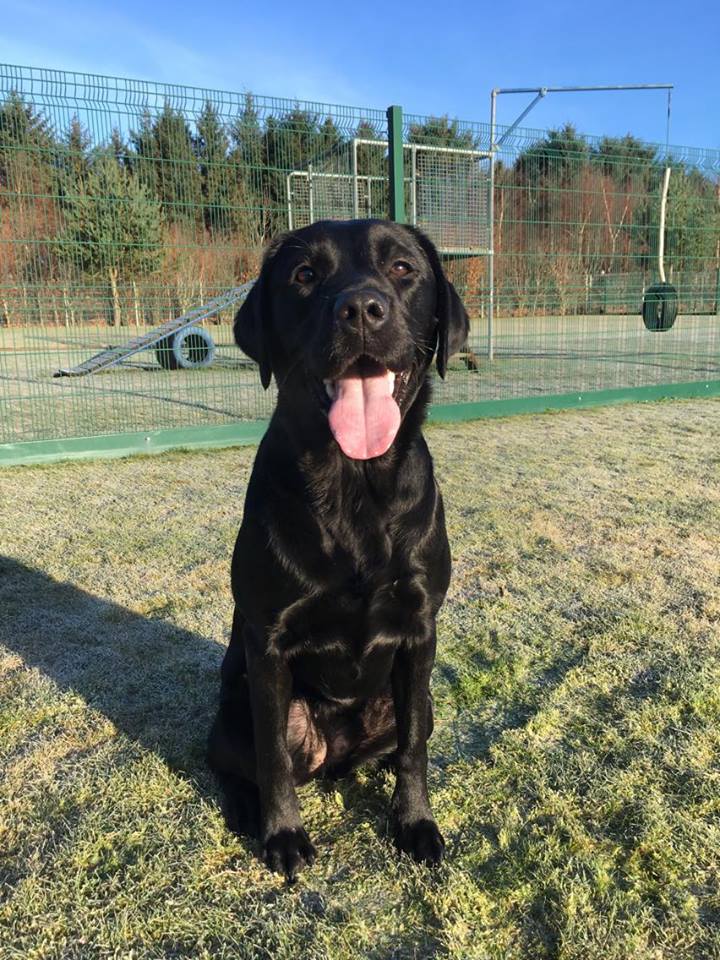
Black labrador sitting on the frosty grass
Managing the dogs and their boarder homes can be like spinning plates but Audrey takes pride in it, she’d much rather see them with a family in a house than in the kennels and believes it’s much better for their development. She said the best part is telling the boarder that their dog has passed training and further down the line letting them know what a difference that dog has made to the life of a blind person. On difficult days she said “you can always pet the office dog” and on Wednesday mornings they even get a few puppies stop by. Check out our Puppy Tuffie here.

Mitch the golden retriever puppy being held with a blanket
Impact
I asked Audrey what the most important thing a guide dog gives to a blind person and her answer was independence. “Having a guide dog enables our clients to live a fuller, independent life in whatever way they choose”. Some people literally go blind overnight and that means adjusting everything on the spot. “It changes a person’s life and a guide dog can help them regain the confidence to venture out again.”
Thanks to GDBA for giving us an insight into your world and we hope you enjoy your Tuffies Dog Beds! Find out how you can donate at www.guidedogs.org.uk/donate-now.
-
27/10/2020 11:05
Jenna and Smudge - Long Dog Walkies
A few years ago Jenna grew fed up of her job as a buyer in the oil and gas industry. After some encouragement from her family she decided to take a leap of faith and start her own dog walking business. ‘Long Dog Walkie.. -
01/12/2020 12:35
Dog Lockdown Tips With a Little Help From Your Nest Dog Bed
Working from home has changed our daily lives in many ways. We have had to learn how to structure our day, get out for some exercise, and use technology to keep in touch with each other. But how did our dogs’ lives cha..



